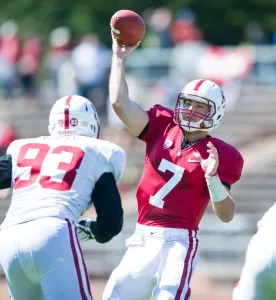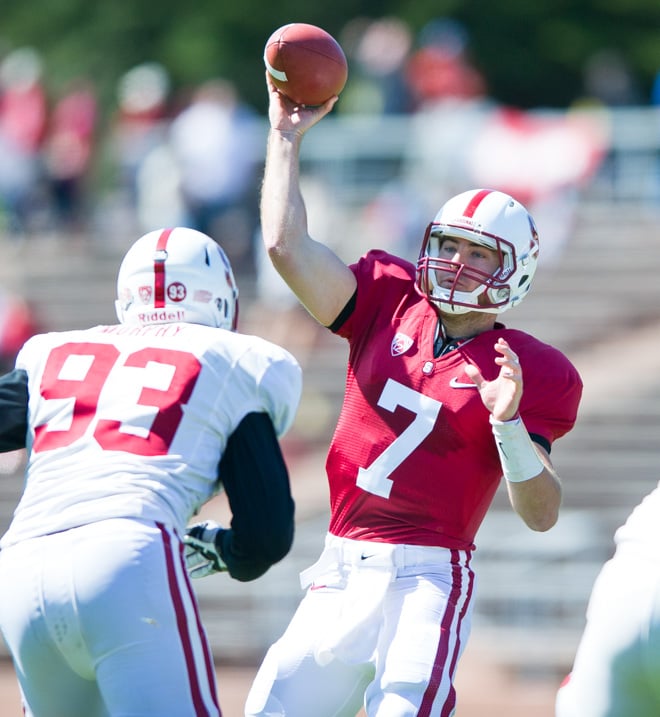It is often difficult to place oneself in the mindset of someone else, to sit at a distance and make assumptions or judgment on their character and actions. Here, we see how two superficially similar decisions can have such rapidly divergent endings and spiral into having such completely separate consequences.
What goes through the mind of someone on the bench? In recent weeks, Jets quarterback Michael Vick admitted he didn’t practice as well as he should have, leading to unpreparedness, and Nick Chubb has backed up the Georgia Bulldogs suspended running back Todd Gurley to the tune of 202 yards and two touchdowns, showing the two extremes of bench performance. Of course, every athlete in college or professional athletics, wants to play and wants to be a starter, but that would be impossible. To define the bench simply as a rite of passage or as “earning your spot” is to demean the individuality of every single player and to ignore the cocktail of expectations, practice and performance that inhabits the mind of every coach and determines the amount of playing time a given player receives. Let’s face it, no matter how much a player may put on a brave face and smile for the cameras, the bench is the last place on earth they want to be.

Of course, this leads us to the case of Brett Nottingham, Andrew Luck’s former back-up, who transferred to Columbia in 2012 after losing what was assumed to be his spot as the starting quarterback to Josh Nunes and, subsequently, to the then-sophomore Kevin Hogan. Nottingham had come to Stanford as a high school star, rated as the fourth-best pro-style quarterback in the country by Rivals.com and throwing for over 7,400 yards and for 91 touchdowns in high school. A local product from nearby Danville, California, Stanford fans and coaches alike were elated to see him de-commit from UCLA in the recruiting process and sign a letter of intent with Stanford.
The summer after Luck went to the NFL, The Sporting News would say, referring to Nottingham, that “you could not go into a basement and concoct a much better-looking quarterback than this”. The weight of expectations were already heavy in the air, but if anyone could live up to them, it would be Brett Nottingham, he of blue-chip size and a cannon arm. Nottingham himself said in an interview with the New York Daily News, “Everyone was like, ‘When are you going to go to the NFL?’”
It is here that the story begins to take a darker road. Nottingham would be passed over in 2012 as a replacement for Josh Nunes for the more mobile Hogan and watched his teammate lead the Cardinal to a 12-2 record and a Rose Bowl victory over Wisconsin. Faced with the somber fact that his playing time would be scarce in the future, Nottingham transferred mid-year to Columbia, forfeiting his eligibility for the rest of the year and decamping to the East Coast, where he hoped to resurrect the hopes of a team that had not posted a winning record in 18 seasons.
Here, a classic story would have Nottingham living happily in New York, leading the Lions to respectability, if not success, and finally getting the starring role observers had long expected of him. Those classic stories, however, have no truck with life. Nottingham would throw only 23 passes before being tackled on a scramble against Fordham, which led to a broken right wrist and another missed year of playing.
This was not the end. Naiveté would have one hope that upon his return this year to the Lions’ team, Nottingham could finally overcome the setbacks that had plagued his career. His natural talent would assert itself and a successful season would be had. Such storybook lines would once again be denied to him. Nottingham, perhaps rusty after two whole years of his career fell by the wayside, completed 55 out of 113 passes, with a poor 1:7 touchdown/interception ratio for the Lions before being benched in favor of junior Trevor McDonagh.
Reports from New York City now indicate that Nottingham has quit the team and he is no longer listed on the Columbia athletics webpage.
Columbia coach Pete Mangurian told the Columbia Spectator, “Having received no response to numerous attempts to reach Brett, we are moving forward with our preparation as though he will not be part of our football program.”
And so, for now, this is how the career of a hyped, touted, can’t-miss prospect seems to end, amidst recriminations, injuries and the sad specter of promise lost.
***
David Olson, on the other hand, suffered from no such expectations. A 3-star prospect from the small time of Irmo, South Carolina, Olson spent four years at Stanford as a career back-up quarterback, graduating in 2013 with a degree in Management Science and Engineering before deciding to make use of his fifth year of eligibility to head home to South Carolina and attend Clemson.
Olson said in an interview with FOX affiliate WACH that, “I thrive in an environment where I’m able to come in and compete,” and seems excited to be back home. Olson is under no delusions about his place on the team, stating that, “I’ll initially be going in as a back-up … but I’ll try to get on the field.”
Olson is perhaps the converse of Nottingham, in that his transfer experience has been largely positive and he came in to Stanford with no expectations that he would be the leader of the program’s renaissance. Although they made the same decision to transfer, their current situations could not be more different.
Looking at these two cases once again reinforces the fallacy of attempting to predict a player’s future, much less predict his mindset. Yet, perhaps, the saddest legacy that Nottingham’s story leaves is that it makes us forget stories like Olson’s. Nothing ever turns out just the way we would expect or even how we would hope, but it remains important that when we see a story that ends in happiness, we make all the effort to imprint it on our brains.
Contact Dylan Fugel at dfugel ‘at’ stanford.edu.
